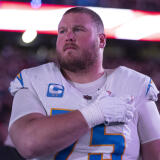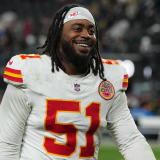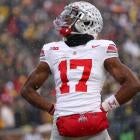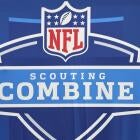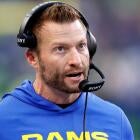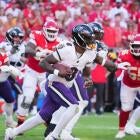
Joe Namath on Mike Ditka's comments: 'Look up the meaning of oppression'
The Jets legend refutes Ditka's claim that 'There has been no oppression in the last 100 years'
After Bears Hall of Famer Mike Ditka claimed, "There has been no oppression in the last 100 years that I know of," another Hall of Famer told Ditka to do some more research. On Tuesday, Jets legend Joe Namath refuted Ditka's claim, telling him to "look up the meaning of oppression."
"Look up the meaning of oppression," Namath said on "Fox & Friends," according to TheHill.com. "Look up the definition of oppression, and you understand that it's obviously taken place."
Namath is, obviously, correct while Ditka is, obviously, wrong. I'll let my colleague Pete Blackburn explain why, because I would've written the exact same thing -- that's how obvious Ditka's mistake is:
Not to turn this into a math lesson, but 2017 minus 100 is 1917. To say there has been no oppression in America since 1917 is, well, astoundingly idiotic, to be completely honest. Even if you want to argue that the key part of Ditka's quote is the "that I know of" portion -- as that suggests that maybe Ditka was talking about his own personal experiences with oppression -- it's still a terribly dumb thing to say.
Not experiencing something firsthand isn't an excuse to pretend or claim it doesn't exist, and Ditka simply has no excuse here. He's 77 years old, meaning he was literally a young adult or full adult through much of the Civil Rights movement. He was 16 when Rosa Parks was arrested. He was 24 when the Civil Rights Act passed. He was 25 when the Voting Rights Act passed. He was 29 when Martin Luther King, Jr. was assassinated.
He's been an adult in America for a long time and he's also been surrounded by people of color in America for a long time. He should certainly know better. Hell, if Ditka was born even five years ago he'd have quite a difficult time arguing that there's been no oppression during his lifetime.
Anyway, moving past Ditka's claim, Namath also said something smart about the NFL protests during the national anthem.
"Going back to what Colin Kaepernick initially did, it was to point out some injustice that's being done to the black race," Namath said. "Or to people that obviously when you look -- and I say obviously, some of these dash cams and shootings that were done to unarmed people. He was reaching out to try to get it more investigated. So that's where this oppression thing comes in."
That's an important point. When Kaepernick started his protest a year ago, he wasn't refusing to stand for the national anthem in order to disrespect the flag. That wasn't his mission. He refused to stand for the flag to protest racial injustice. His protest was carried on by players like Michael Bennett this season and it continued until Donald Trump said on Sept. 22 that players who kneel during the anthem should be fired. Since Trump made those inflammatory remarks, the protests against racial injustice during the anthem have shifted to demonstrations of unity against Trump.
But it's worth remembering that Kaepernick wasn't sitting during the anthem to demonstrate unity. He was protesting racial injustice and oppression, which as Namath pointed out, has taken place.


